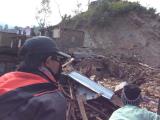Activities after the earthquake - a short overview (12/11/2015)

Much has happened in Nepal since the earthquakes in April and May. Nepal has a new constitution that brought hope but also new unrest. However, the reconstruction is progressing sluggishly. In the following we will give a short account on the activities of Tapriza and Tashi D. in the past months.
In the weeks after the first earthquake, during the confusion and the constant aftershocks, the first help went to our students in the hostel in Kathmandu. They needed tents, tarpaulin, water, medicine, communication possibilities and so forth. All of these were difficult to get and in high demand, therefore expensive.
Thanks to the swift support of the Rotary Club Oberstdorf, we could quickly send five PAUL water filters to Dolpo and the more severely effected regions.
In these first weeks we supported the monks of the Triten Norbutse Bon Monastery in Kathmandu und the Students of Dolpo each with a financial contribution. The monks offered important firstaid in their surroundings in Kathmandu and also in the severely hit adjoiningregion – even though their own monastery was damaged and the monks were livingin tents around in their compound. We supported the students in their quick andbrave emergency relief into the cut-off villages. The young men and women from Dolpo, all of them known to the NGO board, organised the required material and drove and trekked into the affected villages to directly render help.
In the fist months after the earthquakes we deliberately waited, collected information, and clarified the requirements, so that we could contribute purposefully to the long-term reconstruction – insofar as this is possible with our means and knowledge. Besides reconstructing the Tapriza school’s west wing that was severely damaged during the earthquake, we so far focused on awareness campaigns and preparations that will help during future earthquakes. This is especially important because tension has built up in the western Himalayas and experts expect the next earthquake will more likely occur in this geographical region. It is also important to us to support our teachers in the reconstruction of their own houses. Some of them loyally stayed at the school and continued their work, even though they hail from affected areas and their houses were damaged. We are helping them reconstruct a safe house for their families.
With the donations that exceed these efforts we would like to support the rebuilding in the severely affected regions Dolakha and Gorkha where we are in contact with anthropologists. Because it is still being evaluated if it is possible to rebuild the villages in their present location or if the villagers need to be relocated, we are still negotiating how we can best support the reconstruction.
jb